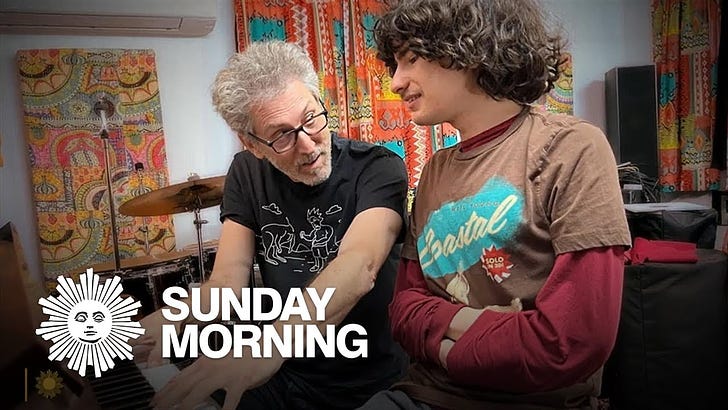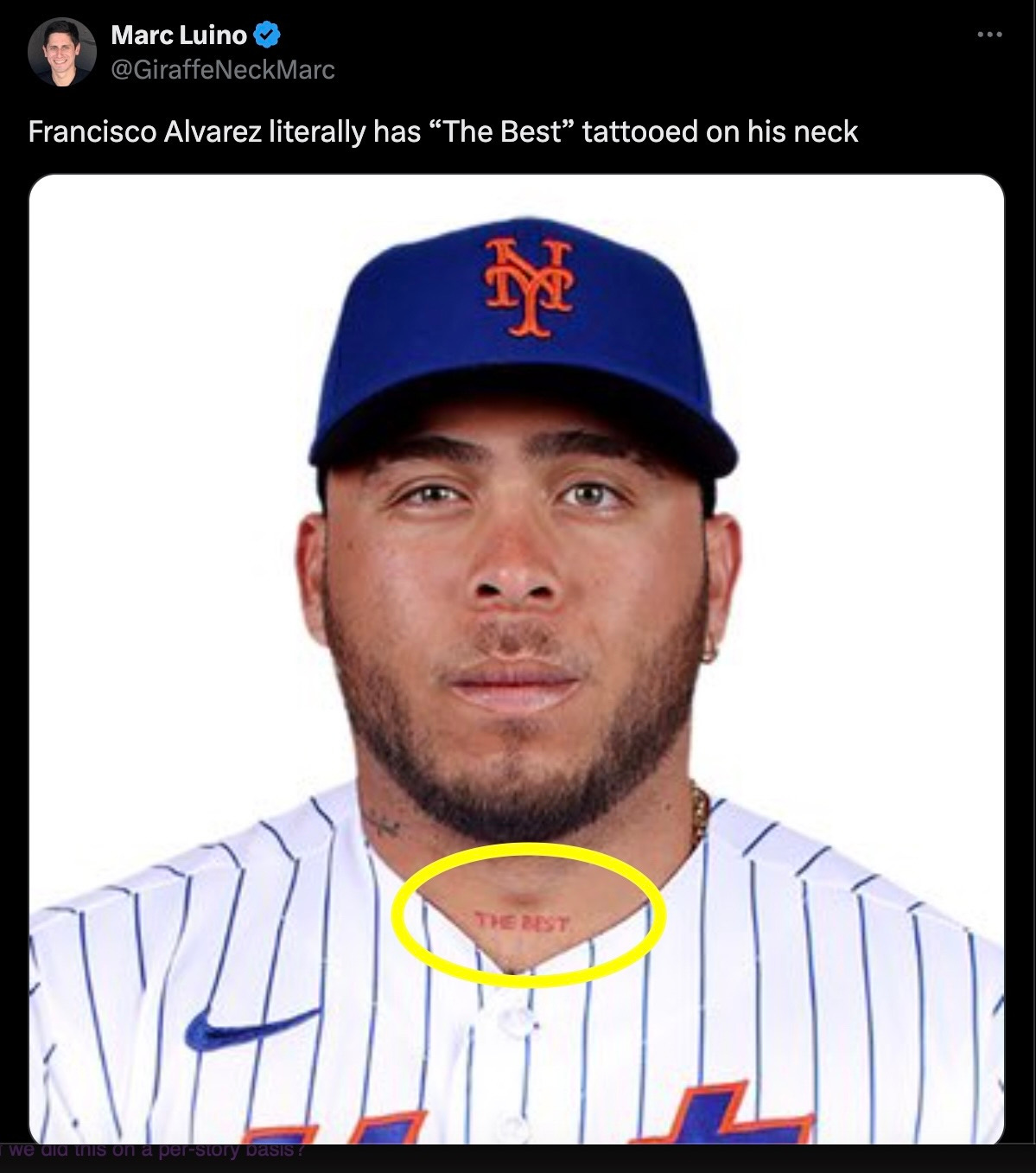Waterfall of the Gods
Sometimes natural beauty is so overwhelming, it makes you emotional for reasons that aren’t clear. This was my experience on a recent trip to Iceland with Lady Jay. We saw a lot of remarkable sights there — from the Northern Lights to humpback whales to the interior of a volcano to geysers and glaciers.
But nothing hit me the way a waterfall in North Iceland called Goðafoss did. I stood before it, mesmerized, my eyes moist from the mist in the air and the feelings in my heart. If I could have, I would have stayed there all day and just stared.
But why? Of all the wonders we saw, why was this the thing that most stirred my soul?
I don’t know the answer. But perhaps in the face of such beauty and power, I felt soothed and maybe even relieved — because, in those moments, my problems didn’t feel so important.
The Best…
…Magazine Piece I Watched This Week
“A Young Autistic Man’s Symphonic Odyssey” — CBS Sunday Morning, October 6, 2024
Since this past spring, I’ve been doing some work for CBS Sunday Morning, the venerable weekly magazine show that just began its 47th season on CBS. Not to sound like a corporate shill, but it’s a good show!
A quick thumbnail sketch for anyone who hasn’t seen it: CBS Sunday Morning is a 90-minute program, hosted by Jane Pauley, with several features on an eclectic mix of stories — about art, entertainers, technology, politics, news, nature, and aspects of culture that don’t often get a lot of coverage. It airs at 9 am ET on your local CBS affiliate.
I was struck by a story from last Sunday about Jacob Rock, a 20-year-old nonverbal young man with autism. Communication has always been an enormous challenge, a source of frustration for him and a cause of heartache for his parents.
While Jacob can’t really express language verbally, he’s learned to use type-to-voice technology on an iPad. One day a few years ago, he informed his father that he had composed an entire symphony in his head. Instead of “yeah yeah”-ing his kid, Paul Rock sprung into action.
What followed was an incredible odyssey to get the sounds Jacob conceived down onto paper, then in front of musicians, and ultimately into a concert hall. A Rock family friend, Rob Laufer, did the painstaking work to help make that happen.
The piece is moving, satisfying, and, while ultimately triumphant, it’s a little sad, too. And I wanted more — because it also raises questions about authorship, about how neurodivergent people like Jacob process music, and how closely the finished product matched the sounds his brain originally produced.
But in lieu of a full-blown documentary, this 8-minute story does a wonderful job of telling a most unusual story.
…Documentary Series I Watched This Week
Mr. McMahon (2024) — Directed by Chris Smith
Streaming on Netflix
In 1982, Vince McMahon bought out his father to take control of what was then known as the World Wide Wrestling Federation (later rebranded as the WWF and then WWE). He would go on to turn the operation into a multi-billion dollar cultural behemoth and establish himself as a god-like figure within the pro wrestling community.
Mr. McMahon chronicles the various rises and falls of McMahon and the WWE, how by exploiting his audience’s desire for violence, sex, dehumanizing behavior, and, above all, emotionally compelling storylines, McMahon made himself rich, ruthlessly crushed his opponents, and became both famous and infamous.
Even though I’ve never been a pro wrestling consumer, I knew the contours of the WWE story. I could identify the wrestlers who became mainstream cultural figures. I’d seen McMahon’s heated interviews with Bob Costas and Armen Keteyian. And I knew that Donald Trump was an admirer of McMahon’s and had been an on-air participant in the WWE’s “Battle of the Billionaires” storyline.
What I did not know, and what I found among the more interesting yet disturbing aspects of the series, was the way that McMahon seemingly played out lurid aspects of his own life on the WWE stage — with him, his wife Linda (a two-time loser for U.S. Senate seats in Connecticut), his daughter Stephanie, and his son Shane as the performers.
I always assumed the actors were exclusively the scantily-clad, steroid-enhanced men and women who hit each other with chairs, jumped off the ropes, and clotheslined one another. But the McMahon family was part of that act as well, in narratives that incorporated adultery, rape, and incest.
Yes, it was theater and these were characters performing a story. But the film makes a compelling case that what was happening in front of the cameras — and being beamed weekly into every American home with basic cable — mirrored the psychodrama happening behind the scenes within McMahon’s personal and professional relationships.
It took a long time, but eventually the allegations brought against him of sexual harassment, sexual abuse, and sexual assault, of sex trafficking, and hush-money payments to cover up affairs caught up with him. But not before our real world came to resemble his fantasy world.
…Book I Read This Week
Charlie Hustle: The Rise and Fall of Pete Rose, and the Last Glory Days of Baseball (2024) — by Keith O’Brien
When Pete Rose died on September 30, I was working my way through a recent biography about him. (Thanks to reader Ryan O. for not only recommending the book but also giving me a copy.)
Charlie Hustle: The Rise and Fall of Pete Rose, and the Last Glory Days of Baseball, by Keith O’Brien, is a comprehensive portrait of a man who was one of baseball’s greatest winners on the field and biggest losers off it. (And, incidentally, a WWE performer several times over the years.)
Let’s get the accolades out of the way first. Rose was a 17-time all-star, a three-time World Series champion, and owns one of the hallowed records in baseball history: 4,256 career hits. At a time when baseball still mattered culturally, he was an icon for his hard-nosed, all-out style of play that earned him millions of fans and the nickname “Charlie Hustle.” (O’Brien notes that the nickname was bestowed upon him, derisively, by Yankees legends/mean girls Whitey Ford and Mickey Mantle.)
Rose was also a philandering husband, a neglectful father, the definition of a degenerate gambler, and a liar. Those last two points — betting on baseball games and lying about it — are what led to him being banned from baseball in 1989, a lifetime suspension that has kept him out of the Baseball Hall of Fame despite his incredible accomplishments on the field. (The heated debate over whether Rose should be enshrined in Cooperstown rages on.)
Many people have wondered why Rose behaved the way he did, why he knowingly broke his sport’s cardinal rule — you don’t bet on baseball games when you manage or play in MLB and certainly not your own team’s games — and then lied about it over and over again for more than a decade in the face of overwhelming evidence.
It’s widely believed that if he’d admitted what he did sooner and acknowledged he was wrong, the ban would have been lifted and he would have taken his rightful place in Cooperstown.
So why wouldn’t or couldn’t he just do that?
Buried deep in O’Brien’s book, on a totally different subject, is an anecdote that I think provides the key to everything.
In April 1988, while Rose was managing the Reds, he got into an altercation with umpire Dave Pallone during the 9th inning of a tight game against the Mets. Upset with Pallone’s call on a close play at first base, Rose tore out of the Reds dugout and confronted the umpire, ultimately pushing him — an act he knew would earn him a severe punishment from the league office.
When Rose was then handed a 30-day suspension, he refused to apologize or take responsibility for what he did. Instead, O’Brien writes, Rose told an assembled crowd of about fifty reporters, “I hate to say it… but I would probably do it again, if the situation came up. It’s just the way I am.”
It’s just the way I am.
In closing this week, I just want to give a quick thanks to Mets catcher Francisco Alvarez for supporting The Best Newsletter with his neck tattoo. Let’s go Mets!



